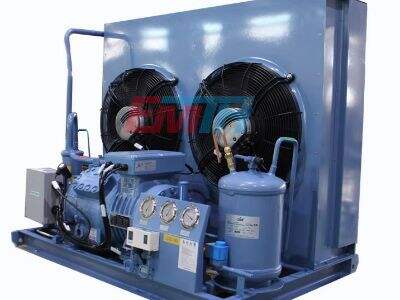How a Condensing Unit Regulates Cooling Load in Commercial Refrigeration
Author: Charles D RIVER - Robert G BROWN Knowing The Function Of A Condensing Unit In Commercial Refrigeration Units Food and drinks should be kept cold in commercial refrigeration, and space for ice is a priority in Cold room and freezer room. Here’s where a condensing unit can help! It does sound like the condensing unit of a refrigerator or freezer. It works to control the cooling load, to keep everything at just the right temperature.
A Key Component in Refrigeration
The condensing unit is one of the essential components of a commercial refrigeration system. It accomplishes this by extracting heat from the inside of the Coldroomevaporator or freezer, and then dissipating it outside. This is to help the insides remain cool, so everything, food and drinks, stay fresh.The Condensing Unit's Role RevealedThe condensing unit is comprised of a number of essential parts. 4 is a diagram showing the main components of a refrigerant cooling system, which include a compressor, coil, fan and liquid line. The compressor assists the condenser coil in pumping refrigerant gas throughout the system and cooling it. The fan extracts heat from the condensing coil and the liquid line returns the cooled refrigerant into the system.
The Role of Condensing Units in Maintaining Smooth Operations for Commercial Refrigeration
Condensing units are the driving force in keeping your Commercial refrigeration condensing units running smooth. The cooling load is controlled so that food and beverages are kept at the optimal temperature. This can help prevent spoilage and ensure happy customers.Maximizing Condensing Unit Performance in Packaged Refrigeration Picture 1 Commercial Refrigeration SystemsHere are a few options to maximize the efficiency of a condensing/compartment unit which is part of a commercial refrigeration system. A simple step, that you can take, to solve this problem is ensuring that the condenser coil is free from dirt and debris.
This should assist with air flow and help to keep the unit cooling properly.
Another tactic is to monitor your refrigerant levels to make sure they are not low and top them off if needed. If your system is low on refrigerant, it will overwork, run up your energy bill, and could also lead to a breakdown.Regular maintenance is also crucial to the proper running of a condensing unit. By arranging for routine check-ups and tune-ups, you’re more likely to catch any potential problems early and avoid expensive repairs later on.

 EN
EN
 AR
AR
 BG
BG
 HR
HR
 CS
CS
 DA
DA
 NL
NL
 FI
FI
 FR
FR
 DE
DE
 EL
EL
 IT
IT
 JA
JA
 KO
KO
 NO
NO
 PL
PL
 PT
PT
 RO
RO
 RU
RU
 ES
ES
 TL
TL
 IW
IW
 ID
ID
 LT
LT
 SR
SR
 VI
VI
 HU
HU
 TH
TH
 MS
MS
 AZ
AZ
 JW
JW
 LO
LO
 MN
MN
 SO
SO
 MY
MY
 KK
KK
 TG
TG
 UZ
UZ
 GD
GD
 XH
XH

